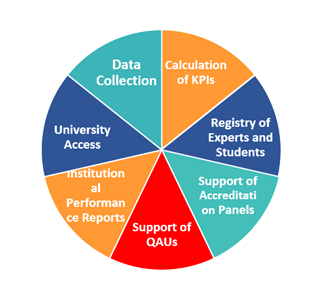Contact +30 211 1903 400
Study Programme Accreditation
The accreditation certificate of the Study Programme (SP) is granted if the latter complies with the quality requirements of the relevant HAHE quality standard.
IQAS Accreditation
Every Higher Education Institution implements an internal quality assurance system (IQAS), which is evaluated and accredited.
HEI’s evaluation
Initial stage in quality assurance based on the general assessment of the academic work of a Higher Education Institution.
Register of Experts and Students
The Authority maintains a Register of Experts & Students for the formation of external evaluation & accreditation panels.
Graduate tracking
Graduate tracking refers to the process of monitoring & evaluating the career path of higher education graduates.
The quality indicators which have been developed present the performance of academic units in 5 areas:
- Teaching work
- Research and innovation
- Funding
- Human resources
- Infrastructure and services
More specifically, the NISQA through two subsystems (quality data & BI) performs the following operations:
- Collects quantitative data annually (526 data fields: Institution 179, Department 157, Undergraduate Study Program 132, Postgraduate Study Program 40 and Ph.D. program 18) from all HEIs of the country for each academic/calendar year
- Calculates 263 KPI's through the BI platform: Institution (130), Department (55), Undergraduate Study Program (51), Postgraduate Study Program (18) and Ph.D. Program (9).
- Is accessible to any Institution through its QAU, which has full responsibility for the collection and submission of data. Each QAU has NISQA management rights and the ability to create internal users for the academic quality assurance units (OMEA). Currently, HAHE collaborates with the Institutions and supports around 1,200 users, answers questions (about 1,200 to date) to clarify the definition and significance of the data, and publishes related reports. The system collects data from 2015-2016 till today.
- Produces a detailed and concise overview of Institutions, Departments and study programs for all HEIs in the country (through KPI’s indicators performed by BI system), used in studies, the HAHEs annual quality report, the development of a Quality Assurance Strategy, the proposal for a national strategy on higher education, expert training, etc.
- Provides QAUs with structured reports to facilitate the Institutional quality planning, the IQAS monitoring and the preparation of internal evaluation reports and more generally to support decision-making in HEIs.
- Provides structured reports to the Accreditation Panels for their information during the external evaluation process.
- Enables the management of the experts` registry
The quality data of institutions entered into NISQA was classified and grouped by academic entity/unit (Institution, Department, Undergraduate Study Programme, Postgraduate Study Programmes, Ph.D Study Programme) and subsequently by thematic field, as shown in the following Table.
| Institution | |
| INSTITUTION IDENTITY - CUMULATIVE DATA | Cumulative data on the institution’s programmes, geographical spread and spatial planning, students and human resources. |
| ADMINISTRATIVE SERVICES | Data on employees working in the institution’s services. |
| FINANCIAL DATA | Data on the institution’s ordinary budget and Public Investment Programme funding and expenses. |
| INFRASTRUCTURE - SERVICES | Data on classrooms, laboratories, libraries, other facilities and digital services provided by the institution. |
| RESEARCH ACTIVITY | Data on the institution’s research activity and recognition of research work. |
| STUDENT WELFARE | Data on students’ meals, accommodation, health services, scholarships and counseling. |
| ACADEMIC - SOCIAL RESPONSIBILITY | Data on the Institution’s social and environmental actions. |
| INTERNAL QUALITY ASSURANCE SYSTEM (IQAS) | Data on the institution’s quality assurance policy, student monitoring procedures, procedures for mapping out students’ opinions, publishing quality information and QAU information systems. |
| Department | |
| IDENTITY | Cumulative data on the department’s programmes and doctoral theses. |
| STAFF (POPULATION) | Detailed data on the department’s human resources. |
| STAFF (RETIREMENT) | Detailed data on the department’s human resources. |
| STAFF (RESIGNATION) | Detailed data on the department’s human resources. |
| STAFF (NEW RECRUITMENTS) | Detailed data on the department’s human resources. |
| STAFF (DEVELOPMENT) | Detailed data on the department’s human resources. |
| STAFF (OTHER DATA) | Detailed data on the department’s human resources. |
| FINANCIAL DATA | Data on the department’s funding and expenses. |
| INFRASTRUCTURE - SERVICES | Data on classrooms, laboratories, libraries, other facilities and digital services provided by the department. |
| RESEARCH ACTIVITY | Data on the department’s research activity and the production and recognition of research work. |
| Undergraduate programme | |
| UNDERGRADUATE PROGRAMME - GENERAL DATA | General data on the undergraduate programme (academic credits, creation, restructuring, language of courses offered etc.). |
| STRUCTURE AND ORGANISATION OF STUDIES | Data on the organisation of studies (structure and number of courses, student obligations etc.) |
| E-CLASS | Data on e-class and services provided. |
| INTERNSHIP | Data on students’ internship. |
| DESIGN OF THE UNDEGRADUATE PROGRAMME | Data on the actors involved in the design of the undergraduate programme. |
| STUDENTS (ADMISSION) | Detailed data on student admission in the undergraduate programme. |
| STUDENTS (POPULATION) | Detailed data on the student population enrolled in the undergraduate programme. |
| STUDENTS (ACCESSIBILITY) | Data on students with disabilities (PWD) enrolled in the undergraduate programme. |
| STUDENTS (MOBILITY - INTERNATIONALISATION) | Data on student mobility (ERASMUS, incoming and outgoing students). |
| GRADUATES (POPULATION) | Detailed data on graduates of the undergraduate programme. |
| GRADUATES (PERFORMANCE) | Detailed data on the performance of undergraduate programme graduates. |
| GRADUATES (ABSORPTION) | Detailed data on the absorption of undergraduate programme graduates by the labour market. |
| Postgraduate programme | |
| POSTGRADUATE PROGRAMME-GENERAL DATA | General data on the postgraduate programme (creation, restructuring, language of courses offered etc.). |
| STRUCTURE AND ORGANISATION OF STUDIES | Data on the organisation of studies (structure and number of courses, student obligations etc.) |
| Doctoral programme | |
| DOCTORAL PROGRAMME - GENERAL DATA | General data on the doctoral programme, doctoral candidates and degrees awarded. |
As part of ΗΑΗΕ’s responsibilities and in accordance with its institutional framework, the Authority, in 2015 developed the National Information System for Quality Assurance in Higher Education (NISQA), which is structured in 5 subsystems: a) Data of Quality of Higher Education, b) Business Intelligence, c) Register of Experts, d) Accreditation Management, e) Internal Operation.
QDATA
National Information System for Quality Assurance - NISQA

Το enter the Quality Data Management System, please click here
The Registry of Experts is used by the HAHE mainly for setting up IQAS and Study Programme Accreditation Panels and for supporting any quality assurance process.
Τhe members of the Accreditation Panel are committed to:
- act with integrity, objectivity and confidentiality;
- thoroughly examine the information and background data submitted;
- take into account the context of the Higher Education Institution;
- follow the guidelines of HAHE and adhere to the philosophy of quality assurance and continuous improvement;
- avoid conflicts of interest; the members of the Panel should inform HAHE of any association with the host Institution (currently, or during the past five years) and of any scheduled engagement or affiliation, so that their impartiality may not be questioned. Associations which may cause a conflict of interest are, for example, close family relationship, professional or research collaborations with senior members of the Institution, special awards received by the Institution in question, and any other official relationship (HAHE will consider each case separately);
- work closely as a team, under the guidance of the Chair of the Panel and adhere to the defined deadlines;
- take into consideration that the accreditation process is oriented to improvement, rather than just identifying areas of weakness; it must not be used as means for a potential growth of personal interests. All those who have been members of Accreditation Panels should avoid using information related to the evaluations for financial profit (e.g. by serving as consultants for Higher Education Institutions that they have reviewed), without the permission of HAHE;
- base their assessments on the evidence gathered;
- mention in their final report external interferences, if any, which have hindered their work.
Furthermore:
The Chair of the Panel is mainly the person who organises and coordinates the discussions and takes care for averting or releasing any tension that may come up during the entire review process. In addition, the Chair is responsible for the timely submission of the written report, and serves as a contact between the HAHE and the Panel.






